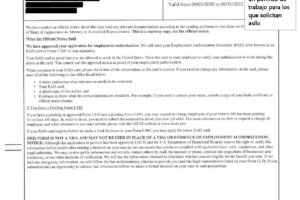How to Write an Effective Immigration Suffering Letter

If you are in the United States and are facing challenges with your immigration status, a hardship letter can be your best ally.
This document helps you explain your case to the immigration authorities in a personal and detailed way. Here we show you step by step how to do it.
What is a Letter of Suffering?
A Letter of Suffering, in the immigration context, is a personal and detailed document sent to the immigration authorities.
Its primary purpose is to illustrate and argue the significant negative impact or extreme hardship that an individual or his or her family would face in the event that his or her application for visa, asylum or adjustment of status is not approved.
This letter is a tool to humanize your case and provide context beyond the official forms and documents.
- Emotional Impact: The letter should convey not only the facts, but also the emotional and psychological impact of the situation.
- No Guarantee of Success: Although a valuable component of your application, the letter alone does not guarantee a favorable decision. However, it can significantly influence how the immigration officer perceives your case and your circumstances.
- Customization: It should be highly personalized to reflect your unique situation, including specific details and personal contexts that only you can provide.
Steps to Write Your Letter
- Write in English and Detail Your Information: Your letter must be in English. Start with your data: name, address, date and the details of the person to whom it is addressed.
- Talk about your Personal Situation: Explain clearly your current situation. If you have health problems, or if you cannot receive the treatment you need in your country, include it here.
- Present Proof: It is important to back up your words with evidence. Talk about living in the U.S. improve your life and that of your family.
- Say Goodbye Waiting for a Reply: End your letter politely, waiting for a reply. Do not forget to attach documents that support your case.
Practical Examples
Here are two examples: one in English and one in Spanish. In them, you will see how others have explained their circumstances and how they have asked for help.
Sample Letter of Suffering in Spanish
[Nombre del Remitente] [Dirección del Remitente] City, State, Zip Code] [City, State, Zip Code [Correo Electrónico del Remitente] [Fecha]
[Nombre del Funcionario de Inmigración] [U.S. Citizenship and Immigration Services (USCIS)] [Dirección de la Oficina de USCIS] [City, State, Zip Code].
Dear [Nombre del Funcionario de Inmigración]:
I am writing to you in the hope that this letter finds you well. I am writing in support of my [relación familiar o amistosa] [Nombre del Inmigrante], who is requesting [tipo de visa o ajuste de estatus].
I am [tu nombre], [tu nacionalidad] and currently reside at [tu ubicación]. [Nombre del Inmigrante] and I have shared [describir la relación y los años de conocimiento]. During this time, I have witnessed [describir las cualidades positivas y contribuciones del inmigrante].
In our community, [Nombre del Inmigrante] has proven to be [describe community contributions, work ethic or family support]. It is important to note that [explain the specific situation that justifies the request, such as health problems, economic hardship or the importance of the immigrant in the family unit].
The presence of [Nombre del Inmigrante] in the United States is crucial to [explain the importance to the family, community or to the immigrant himself/herself]. In his home country, [Nombre del Inmigrante] would face [describir dificultades o peligros específicos].
I conclude this letter by respectfully requesting that you consider the request at [Nombre del Inmigrante]. Attached you will find relevant documents supporting this request.
I appreciate your time and attention to this matter.
Sincerely yours,
[Firma del Remitente] [Nombre del Remitente]
Sample Letter of Suffering in English
[Your Name] [Your Address] City, State, ZIP Code] [City, State, ZIP Code [Your Email] [Date]
[Immigration Officer’s Name] [U.S. Citizenship and Immigration Services (USCIS)] [USCIS Office Address] [City, State, ZIP Code].
Dear [Immigration Officer’s Name],
I hope this letter finds you well. I am writing in support of my [relation to the immigrant] [Immigrant’s Name], who is applying for [type of visa or status adjustment].
As [your name], a [your nationality] currently residing in [your location], I have known [Immigrant’s Name] for [number of years] years. In this time, I have witnessed [describe positive qualities and contributions of the immigrant].
In our community, [Immigrant’s Name] has proven to be [describe community contributions, work ethic, or family support]. Notably, [explain the specific situation that justifies the request, such as health problems, financial difficulties, or the immigrant’s importance to family unity].
The presence of [Immigrant’s Name] in the United States is vital for [explain the importance to the family, community, or to the immigrant themselves]. In their home country, [Immigrant’s Name] would face [describe specific hardships or dangers].
I conclude this letter by respectfully requesting that you consider [Immigrant’s Name]’s application. Enclosed, you will find relevant documents supporting this petition.
Thank you for your time and consideration.
Sincerely,
[Your Signature] [Your Printed Name]
Remember that these letters are examples only and should be customized to reflect your unique situation and provide specific details to support your case. It is highly advisable to seek the advice of an immigration attorney to ensure that the letter is effective and complies with legal requirements.
What You Should Include in Your Letter
The letter of suffering should contain key elements that illustrate your circumstances and the difficulties you would face. Here are some important points to include:
- Financial or Health Dependency: If a family member in the U.S. is dependent on you for financial support or health care, it is vital to detail this. Explain how your absence or deportation would negatively affect their well-being.
- Financial Problems: Describe any financial difficulties you or your family members may face. This may include debts that could not be repaid or the loss of income needed to support the family.
- Care of Children or Sick Family Members: If you are caring for children, elderly or sick family members, detail how your absence would affect their care. Mention if there are no other support options available to them.
- Personal and Emotional Context: Includes information about your integration into the community, your contributions and how you have adapted to life in the United States. It also describes the emotional and psychological impact that separation would have on you and your loved ones.
- Legal Advice: An immigration attorney can provide crucial guidance in the preparation of your letter. They can help you identify the strengths of your case and ensure that the letter complies with legal and administrative requirements.
When to Use a Letter of Suffering
These are the different situations in which this letter of suffering can be of great use to you.
- Deportation: If you are facing a deportation order, the letter can explain how this would negatively affect your family or yourself.
- Criminal Allegations: In cases where a criminal conviction affects your immigration status, the letter can provide further context about your character and circumstances.
- Problems with your Visa: If you are facing difficulties renewing or changing your visa status, the letter may highlight the adverse consequences of failing to do so.
Types of Immigration Forgiveness
These are the different types of immigration waivers you could apply for.
- I-601 Waiver:
- Used when a person has been found to be inadmissible to enter the U.S. for certain reasons, such as prior violations of immigration law.
- The letter must demonstrate that a qualifying relative (U.S. citizen or permanent resident) would suffer extreme hardship if the waiver is not approved.
- I-601A Waiver:
- Allows certain individuals who are in the U.S. illegally. apply for a provisional unlawful presence waiver before leaving the country for visa interviews.
- It focuses on preventing the prolonged separation of families.
- I-212 Waiver:
- For individuals who have been previously deported or removed from the U.S. and wish to return earlier than legally permitted.
- The letter should address the reasons why reentry should be allowed prior to the established period.
Each type of forgiveness requires a unique strategy and a letter of suffering well adapted to the specific circumstances.
It is important to work closely with an attorney to ensure that all aspects are adequately covered and effectively presented.






